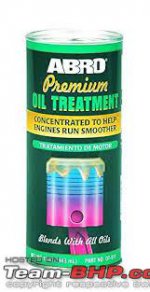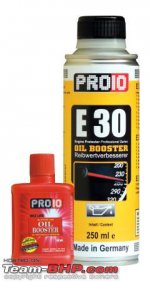I have finalized to utilize Pro 10 Oil Booster and Abro Premium Oil Treatment along with Shell Helix Ultra 5W40 or Mobil 1 Delvac Full Synth for my MJD engine that has run 36.5k on odometer.
This combination has worked well in CRDI engines like mHAWK CRDe and Hyundai's diesel rocket the 1.6 CRDi.
One query i am unable to get clarified is whether, Will the oil treatment additive have any ill effects in the oil cooler and oil evaporator condenser which the 1.3 JTD is equipped with ?
As we are aware this is debate that varies from case to case and my decision to opt for this is by people who have experienced these products in their rides and drives and are seeing results.
Results to the extent of better drive ability, smoother top end revs, quieter cold starts, and less carbon soot in oil.
Super bikes such as R6 and R1 have seen results on these, when a super bike that is technically so complex and that has highest rpm and power generating platform is still not showing any negative symptom, a engine like mjd is very much a ideal candidate to accept an additive of above order is my analysis.
Please provide your expert views.
This combination has worked well in CRDI engines like mHAWK CRDe and Hyundai's diesel rocket the 1.6 CRDi.
One query i am unable to get clarified is whether, Will the oil treatment additive have any ill effects in the oil cooler and oil evaporator condenser which the 1.3 JTD is equipped with ?
As we are aware this is debate that varies from case to case and my decision to opt for this is by people who have experienced these products in their rides and drives and are seeing results.
Results to the extent of better drive ability, smoother top end revs, quieter cold starts, and less carbon soot in oil.
Super bikes such as R6 and R1 have seen results on these, when a super bike that is technically so complex and that has highest rpm and power generating platform is still not showing any negative symptom, a engine like mjd is very much a ideal candidate to accept an additive of above order is my analysis.
Please provide your expert views.



